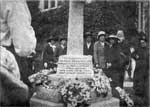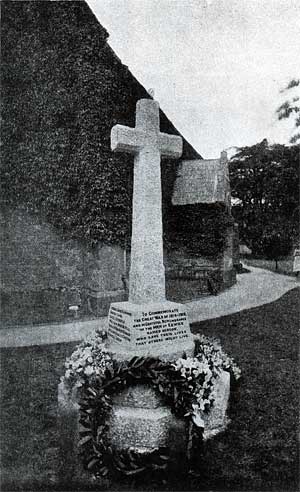
The Exwick War Memorial
 Like many small communities across the country,
Exwick sent her sons to war in the late summer of 1914. By 1918, one
hundred and twenty three young, and not so young, men from the village,
had gone to fight for their country. Fourteen never returned, of which, most were killed
in France, although two died in hospital in the United Kingdom, and one
at sea.
Like many small communities across the country,
Exwick sent her sons to war in the late summer of 1914. By 1918, one
hundred and twenty three young, and not so young, men from the village,
had gone to fight for their country. Fourteen never returned, of which, most were killed
in France, although two died in hospital in the United Kingdom, and one
at sea.
It was a traumatic event for the families and friends, and especially the wives and mothers of the fallen. To remember their sacrifice, a public meeting was held in the school, on 25th September 1919, Mr Snow proposed "That the Exwick War Memorial be a Cross, to be erected in the Church grounds, the exact form of it to be left to a committee."
A subscription was inaugurated that raised £107 10s for the memorial. The final design was a 10ft granite cross, designed by Mr T Easton at a cost of £65, with a further £10 spent on the inscription. It was unveiled on Saturday, the 26th June 1920, by Capt. S R E Snow, who had been one of the first to join up, at the beginning of the war. The memorial bears the inscription "To commemorate the Great War, 1914–1919, and in grateful remembrance of the men of Exwick, named hereon, who gave their lives that others might live."
The dedication was followed by a short service in the church, presided over by the Archdeacon of Exeter and the Vicar, the Rev. H C Brenton.
The balance of the War Memorial Fund was then used as the start of the fund to build the Institute, a club for ex-servicemen and a hall for the use of the village.The Parish Hall was opened in 1921.
The photo, above, (click to enlarge) of the unveiling, shows villagers attending the event, along with the wreaths, The bearded gentleman is Mr Ellacott, while the woman on the extreme right is Mrs Mary Anne Hill whose son Reginald Thomas Hill was killed in 1917.
The fourteen names
Percy Jackman, killed in action in France, 1914.
Major
Charles Gracey, killed in action, October 1916; he has no known grave.
Emmanuel
Rowland, who died in a Plymouth hospital in 1915.
Ernest John
Scriven, killed in action, France July 1917.
Reginald Hill, killed
in action at Ypres, September 1917.
Herman Green, killed in action,
November 1917.
Charles Telling, Royal Engineers, killed in action.
Harry
Cann, wounded and gassed, France, November 1917.
William Stanley
Gratton, died in hospital, March 1918.
Reginald James Blackmore,
killed in action, France in June 1918.
Cecil Crocker, killed in
action, France, August 1918.
William James Charles Jeal, RN
torpedoed off South Wales, February 1918.
William De Viell,
ambulance driver, killed in action, Flanders, in November 1918.
James
Ridgeway, died in hospital, Colchester, March 1919.
Source: Exwick during the Great War, 1914-1919 / by A.H.Rousham

The
newly dedicated Exwick War Memorial.
│ Top of Page │